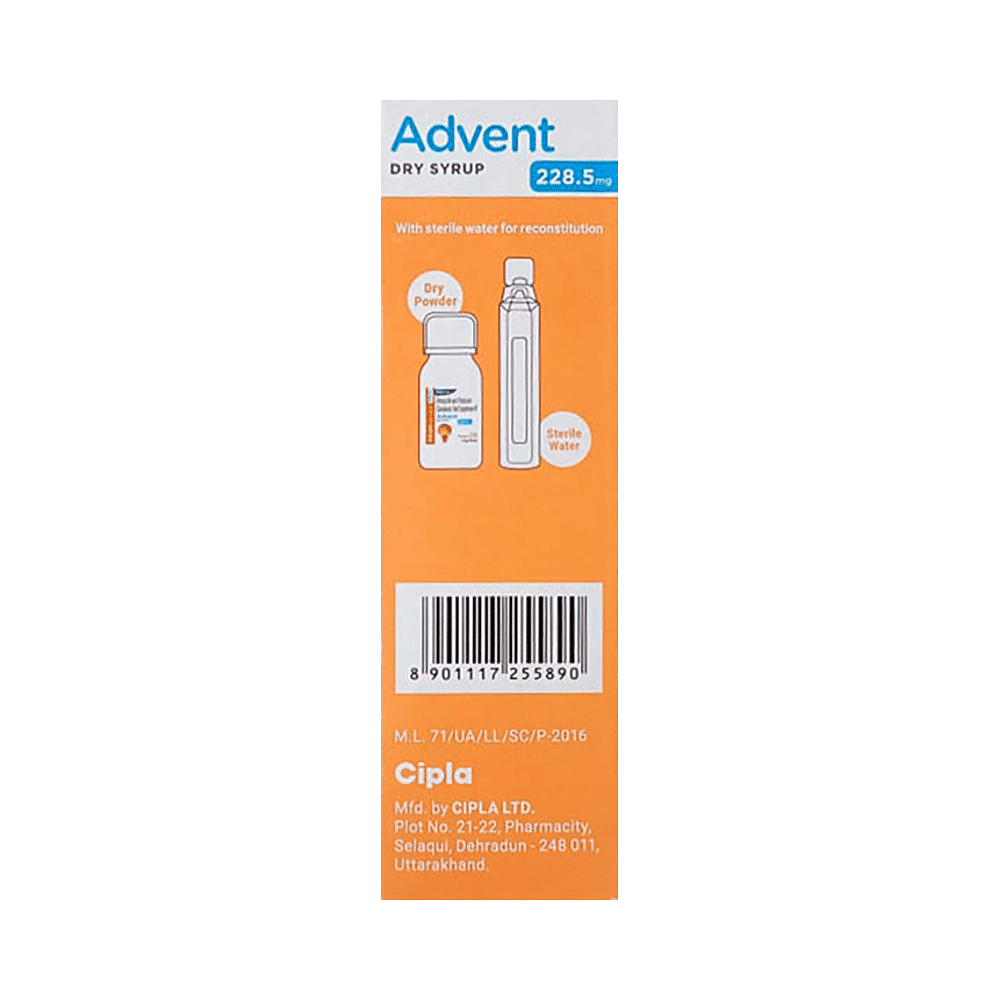
Amboxy CV Dry Syrup
Manufacturer
Unimarck Healthcare Ltd
Salt Composition
Amoxycillin (200mg/5ml) + Clavulanic Acid (28.5mg/5ml)
Key Information
Short Description
Amboxy CV Dry Syrup is an antibiotic medicine that helps treat bacterial infections of the ear, nose, throat, chest, lungs, teeth, skin, and urinary tract.
Dosage Form
Dry Syrup
Introduction
Amboxy CV Dry Syrup is an antibiotic medicine that helps treat bacterial infections of the ear, nose, throat, chest, lungs, teeth, skin, and urinary tract. It is capable of killing bacteria that have become resistant to other therapies and thus also helps treat tuberculosis that is resistant to other treatments.
Directions for Use
Never give Amboxy CV Dry Syrup until and unless prescribed by the doctor. You must also never share your child’s medicine with anyone else even if they show similar symptoms.
Safety Information
Side Effects
No common side effects listed.
How it works
Amboxy CV Dry Syrup is an antibiotic. It has two active agents amoxycillin and clavulanic acid. Amoxycillin works by preventing the formation of the bacterial protective covering (cell wall) essential for the survival of the bacteria. Whereas clavulanic acid serves a special purpose of inhibiting an enzyme (beta-lactamase) that is produced by resistant bacteria. This makes the combination of amoxycillin and clavulanic acid an effective line of treatment for many types of infections.
Quick Tips
Never give Amboxy CV Dry Syrup to treat common cold and flu-like symptoms caused by viruses. Never save medicine for future illnesses. It cannot be said whether the same medicine will work on future infections. Check ‘expiry’ before giving Amboxy CV Dry Syrup to your child. Immediately discard all the expired medicines. Stop Amboxy CV Dry Syrup immediately if your child develops an itchy rash facial swelling or breathing difficulty. Report to the doctor without any delay.
Related Medicines

Advent 228.5mg Dry Syrup Tangy Orange

Saumox CV Dry Syrup

Moxigap CV Dry Syrup

Zemoxy-CV Dry Syrup

Insimox CV Dry Syrup

Zoxiclav Dry Syrup

Reclav 30 Dry Syrup

Yevoclav Dry Syrup

Zerimox CV Dry Syrup

Xyclav Dry Syrup
Frequently asked questions
Can other medicines be given at the same time as Amboxy CV Dry Syrup?
Amboxy CV Dry Syrup can sometimes interact with other medications or substances. It is crucial to inform your child's doctor about all other medicines your child is taking before starting Amboxy CV Dry Syrup. Consulting with your child's healthcare provider before administering any medication is essential for safe and effective treatment.
Can I get my child vaccinated while on treatment with Amboxy CV Dry Syrup?
Antibiotics typically don't interfere with vaccine ingredients or cause adverse reactions in a child recently vaccinated. However, it is recommended to avoid vaccinations until the child has fully recovered from an illness and feels better. Once your child experiences improvement, the appropriate time for vaccination can be determined by their healthcare provider.
Which lab tests may my child undergo while taking Amboxy CV Dry Syrup on a long-term basis?
In instances of prolonged therapy with Amboxy CV Dry Syrup, the doctor might consider periodic monitoring of kidney and liver function to track your child's overall well-being.
Can I give a higher than the recommended dose of Amboxy CV Dry Syrup to my child?
Giving a dosage exceeding the prescribed amounts of this medication can increase the risk of unwanted side effects. If your child experiences a worsening of their symptoms, it is crucial to contact their doctor for re-evaluation.
Can I stop giving Amboxy CV Dry Syrup to my child when the symptoms are relieved?
No, do not discontinue this medication unless your child has completed the full course of treatment. Even if you notice symptom improvement, continuing the medicine for the prescribed duration is crucial as it may still provide beneficial effects.
Can the use of Amboxy CV Dry Syrup cause diarrhea?
Yes, Amboxy CV Dry Syrup can lead to diarrhea. This medication works by eliminating harmful bacteria in your child's body. Additionally, it may affect beneficial bacteria in their stomach, potentially causing diarrhea. Encourage your child to drink fluids like water if they experience this side effect. In case of persistent diarrhea and signs of dehydration (e.g., reduced urine frequency with dark-colored, strong-smelling urine), consult your doctor before administering any medication.
Do all viral common colds result in secondary bacterial infection?
While most cases of viral colds do not lead to secondary bacterial infections, it is important to remember that antibiotics are only necessary after consulting with your child's doctor. If you suspect a possible bacterial infection, seek medical guidance for the correct course of action.
The mucus coming out of my child’s nose is yellow-green. Is it a sign of a bacterial infection?
Yellow or green mucus in the nose does not necessarily indicate a need for antibiotics. During a common cold, mucus can thicken and change color from clear to yellow or green. Symptoms typically last 7-10 days.
Is there any sign which shows that my child needs immediate medical attention?
If your child experiences severe allergic reactions (difficulty breathing, skin rashes), gastrointestinal infections (diarrhea), or liver damage (weakness, pallor, vomiting), immediately contact your child's doctor. While rare, these symptoms are serious and require prompt medical attention.


